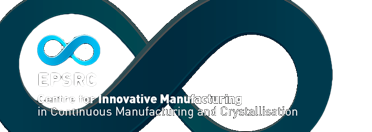Overview of the EPSRC Centre Research
Demand-led Scope

The research scope of the EPSRC Centre has been jointly defined by the academic team together with our industrial partners. The 10 key challenge areas we have identified against the scope provide a focus for the academic engineering and physical science research activities.
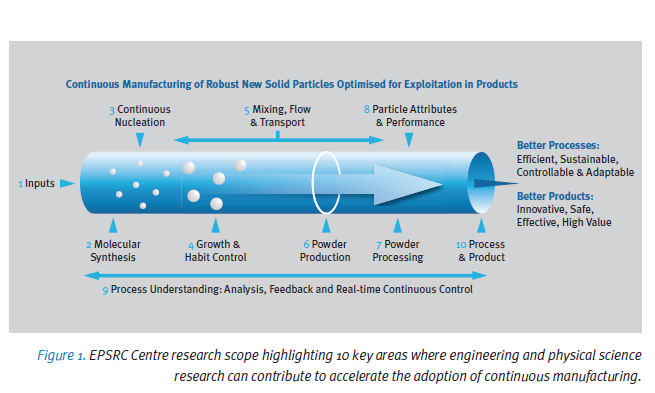
Key Research Challenges were identified in collaboration with industry partners and the initial research programme defined. Further development of the research programme is an organic process and subject to regular reviews and modifications while maintaining a focus on the ten areas in the defined scope. The initial research programme was split across two research themes and their corresponding work packages which work together to deliver the collaborative multidisciplinary programmes of research.
Research Theme 1 - Continuous manufacturing of Solid Particles
Research Theme 2 - Manufacturing Operations and Supply Chain management Challenges in Continuous manufacturing of Solids
Phase II Integration is now underway.
Centre Mission
Through partnership and collaboration between academia, industry and public sector stakeholders we will establish a worldclass Centre of Excellence in continuous manufacturing and crystallisation research. The programme will deliver continuous manufacturing research across three main thematic areas that are developing new understanding and supporting innovation across a range of products, processes and operations.

Multidisciplinary Research
Key to the success of the Centre is the multidisciplinary academic team supporting the research programme. Our initial team involved 13 academic investigators from 7 institutions working with 9 PDRAs, 8 PhDs, technical and administrative staff, harnessing expertise in chemical and analytical, structural and materials chemistry, crystallisation science, pharmaceutical science, manufacturing and operations management, Figure 3. In year 3 the Centre has grown to 14 investigators, 14 associate
investigators, circa 50 PhD students, 12 PDRA’s and a management and support team of 8. The programme will also adapt to meet the challenges of the scope in years 3-5. The academic team also contribute to the innovative training programme developed for the new EPSRC Doctoral Training Centre in Continuous Manufacturing and Crystallisation that will train 45 doctoral researchers from 2012-2016.
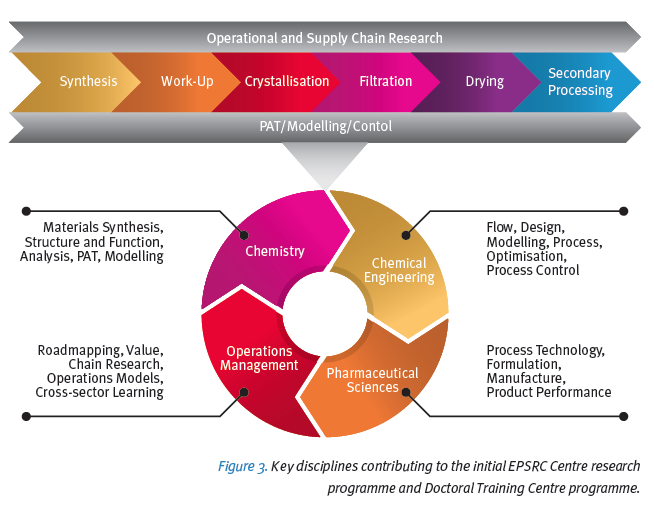
Flagship Projects – Years 1-2
Our foundation research activity is delivered via our flagship research projects against key areas of the research scope (Figure 4). Along with the Centre’s core researchers a platform RA and technician have also been appointed to carry out short-term feasibility projects and assist in evaluation of new technologies.
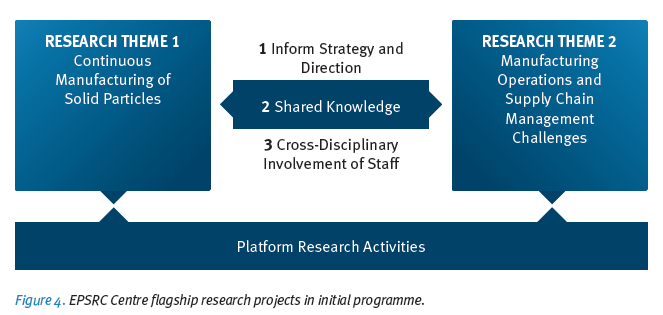
Phase II Themes and Vision
With the initial Centre flagship research programmes having come to an end, the Centre programme moves into Phase II (years 3-5). This builds on the capabilities established and progress made in the initial flagship themes and will deliver an ambitious co-ordinated programme of research that will transform capabilities for continuous manufacturing of high value chemicals and in particular, pharmaceuticals. The direction of Phase II draws on the technical targets and industry problem statements collated by the Centre’s industry technical committee and by extensive discussion across the academic team. Whilst the emphasis of the programme will remain in controlled continuous crystallisation, Phase II also builds on new and emerging projects involving downstream processing including continuous filtration and drying and secondary processing of API into formulated product. This includes understanding how particle attributes impact on performance in downstream operations. Key enablers of Phase II will be new processing and analytical capabilities supported by the £34m UK RPIF award as well as new PhD and academic appointments. The Phase II research programme will be delivered through three core work packages supported by the Phase II Centre funded RAs.
|
WP1 Laboratory-scale continuous process capabilities to support end-to end manufacturing WP2 Tools and workflows for rapid product assessment and continuous process selection WP3 Product-process archetypes that support supply chains of the future |
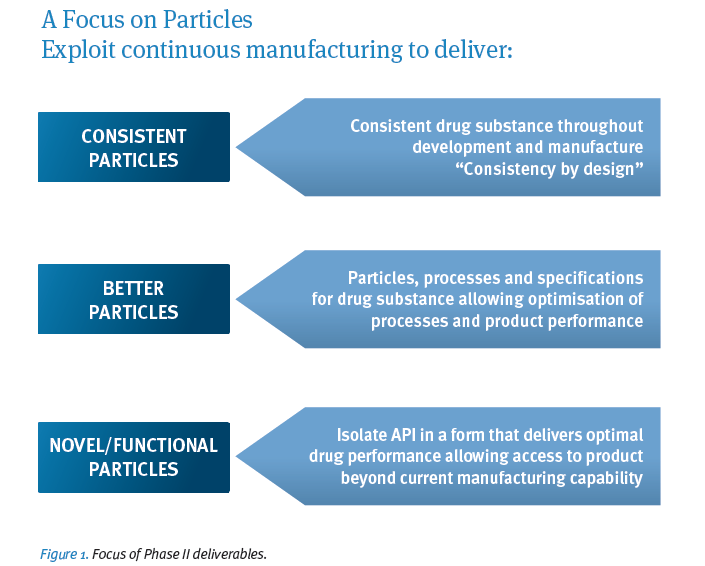
Making Medicines
As part of the Phase II programme, research in the Centre is now actively targeting specific pharmaceutical products where there is a clear opportunity to develop new manufacturing technologies that can aid access to medicines in developing countries as well as addressing the healthcare needs of western economies. Projects will target anti-malarials as well as treatments for HIV, type II diabetes and elevated cholesterol with outcomes demonstrating the ability to improve the medicines supply chain of the future.
